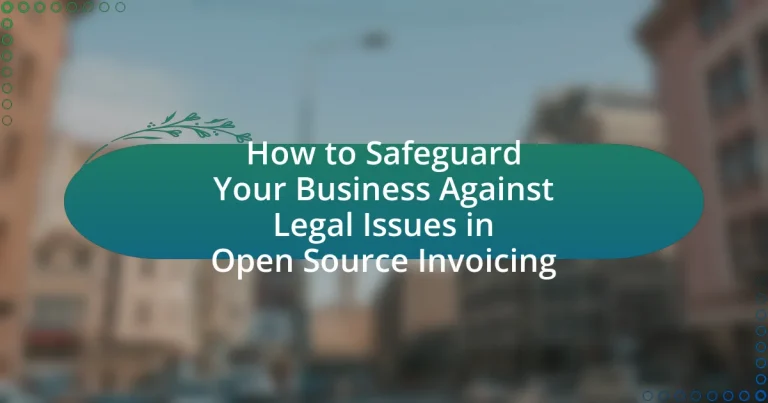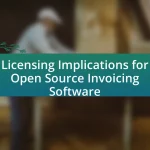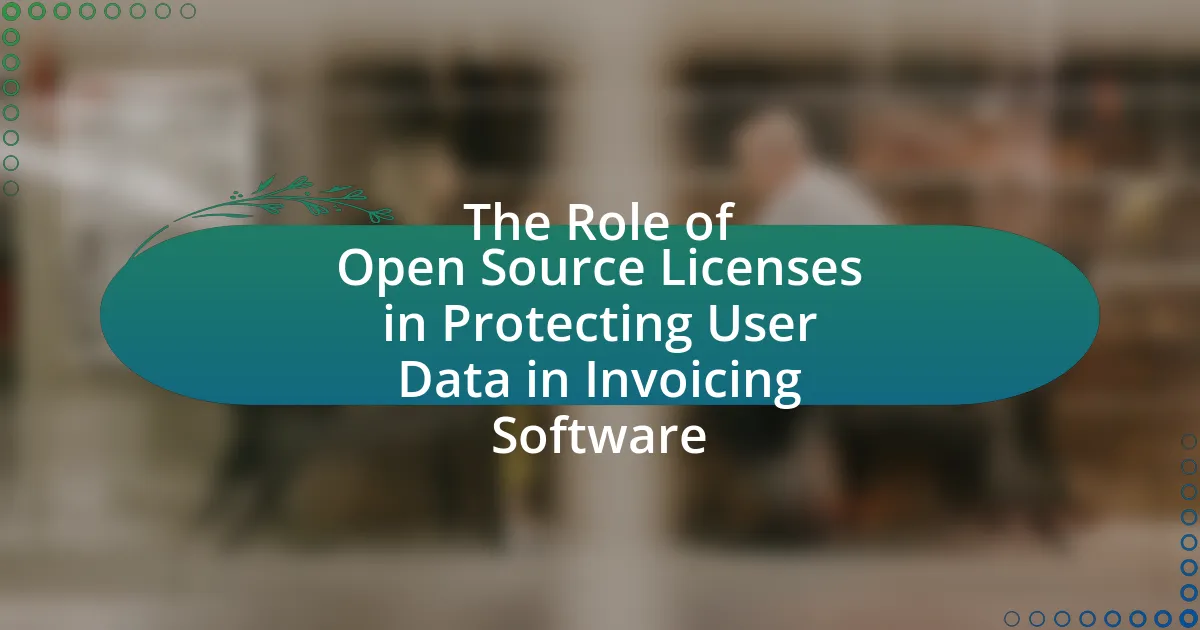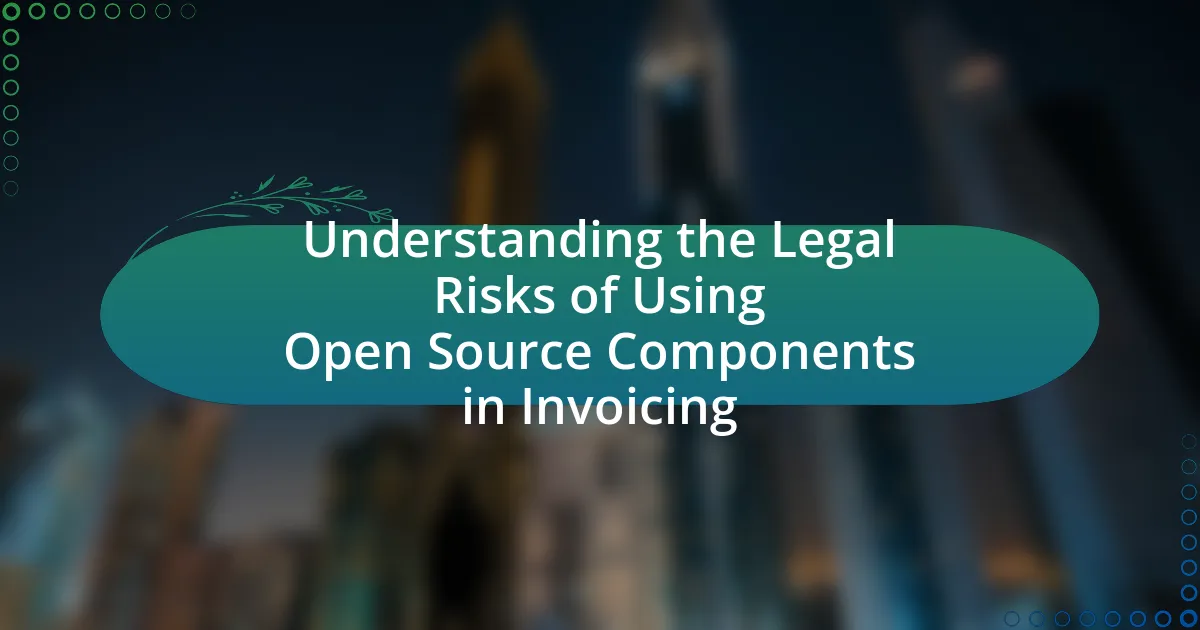The article focuses on safeguarding businesses against legal issues in open source invoicing, emphasizing the importance of understanding licensing, compliance, and potential risks. Key topics include the implications of various open source licenses, the impact of licensing obligations on invoicing practices, and the risks associated with using unverified open source components. It also outlines best practices for compliance, the role of legal counsel, and the significance of employee training and documentation in mitigating legal risks. By implementing a robust compliance strategy and utilizing available tools, businesses can effectively navigate the complexities of open source invoicing and protect themselves from legal repercussions.
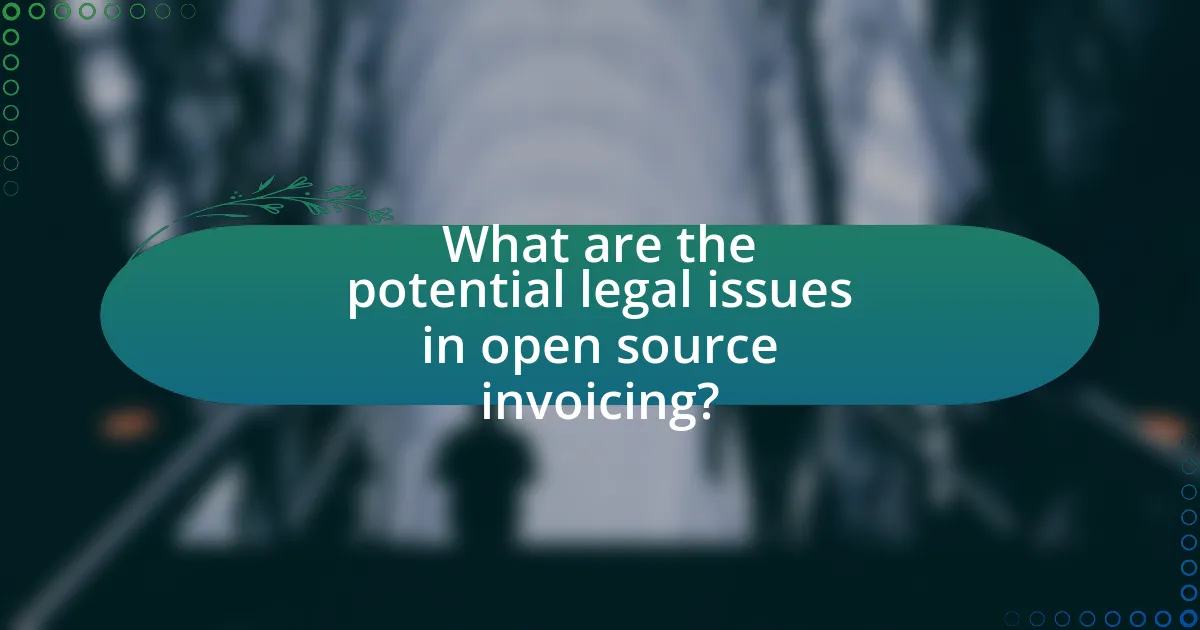
What are the potential legal issues in open source invoicing?
Potential legal issues in open source invoicing include licensing violations, intellectual property infringement, and compliance with data protection regulations. Licensing violations occur when users fail to adhere to the terms of open source licenses, which can lead to legal disputes. Intellectual property infringement may arise if proprietary code is inadvertently included in open source projects, risking legal action from original copyright holders. Additionally, compliance with data protection regulations, such as the General Data Protection Regulation (GDPR), is crucial, as mishandling personal data in invoicing can result in significant fines and legal repercussions. These issues highlight the importance of understanding and adhering to legal frameworks governing open source software.
How can licensing affect your business in open source invoicing?
Licensing can significantly affect your business in open source invoicing by determining how you can use, modify, and distribute the software. Different licenses, such as the GNU General Public License (GPL) or the MIT License, impose varying obligations that can impact your business model, including whether you can charge for the software or must share modifications with the community. For instance, the GPL requires that any derivative work also be open source, which could limit your ability to monetize the software. Understanding these licensing implications is crucial for compliance and can help avoid legal disputes, as companies like Red Hat have faced challenges related to licensing terms.
What are the different types of open source licenses?
The different types of open source licenses include permissive licenses, copyleft licenses, and public domain licenses. Permissive licenses, such as the MIT License and Apache License, allow users to modify and distribute the software with minimal restrictions. Copyleft licenses, like the GNU General Public License (GPL), require that any modified versions of the software also be open source. Public domain licenses, such as the Unlicense, allow software to be freely used, modified, and distributed without any restrictions. These classifications help developers and businesses understand their rights and obligations when using open source software.
How do license obligations impact your invoicing practices?
License obligations significantly impact invoicing practices by requiring businesses to ensure compliance with specific terms when billing for software or services that utilize licensed materials. For instance, if a business uses open-source software under a license that mandates attribution or restricts commercial use, the invoicing must reflect these obligations, potentially altering pricing structures or requiring additional disclosures. Failure to adhere to these license terms can lead to legal repercussions, including lawsuits or fines, as evidenced by cases where companies faced penalties for non-compliance with the GNU General Public License. Thus, understanding and integrating license obligations into invoicing practices is essential for legal protection and operational integrity.
What risks are associated with using open source software in invoicing?
Using open source software in invoicing poses several risks, including security vulnerabilities, lack of support, and compliance issues. Security vulnerabilities arise because open source code can be accessed and modified by anyone, potentially leading to exploitation by malicious actors. The lack of dedicated support means that businesses may struggle to resolve issues quickly, impacting their invoicing processes. Additionally, compliance issues can occur if the software does not adhere to licensing agreements or regulatory standards, which can result in legal repercussions. These risks highlight the importance of thorough evaluation and management when integrating open source software into invoicing systems.
How can copyright infringement occur in open source invoicing?
Copyright infringement in open source invoicing can occur when users modify, distribute, or use open source software without adhering to the licensing terms. For instance, if a user incorporates open source invoicing software into a proprietary product without complying with the license requirements, such as failing to provide proper attribution or not sharing modifications under the same license, this constitutes copyright infringement. The Open Source Initiative defines specific licenses that dictate how software can be used, modified, and shared, and violating these terms can lead to legal consequences.
What are the implications of using unverified open source components?
Using unverified open source components can lead to significant security vulnerabilities and legal liabilities for businesses. These components may contain malicious code or undisclosed vulnerabilities that can be exploited by attackers, potentially resulting in data breaches or system failures. Additionally, unverified components may not comply with licensing requirements, exposing businesses to legal risks such as copyright infringement or violation of open source licenses. According to a 2021 report by the Synopsys Cybersecurity Research Center, 96% of codebases contain open source components, and 70% of those components are outdated, highlighting the prevalence of unverified software in development environments. This underscores the importance of thorough vetting and continuous monitoring of open source components to mitigate risks.
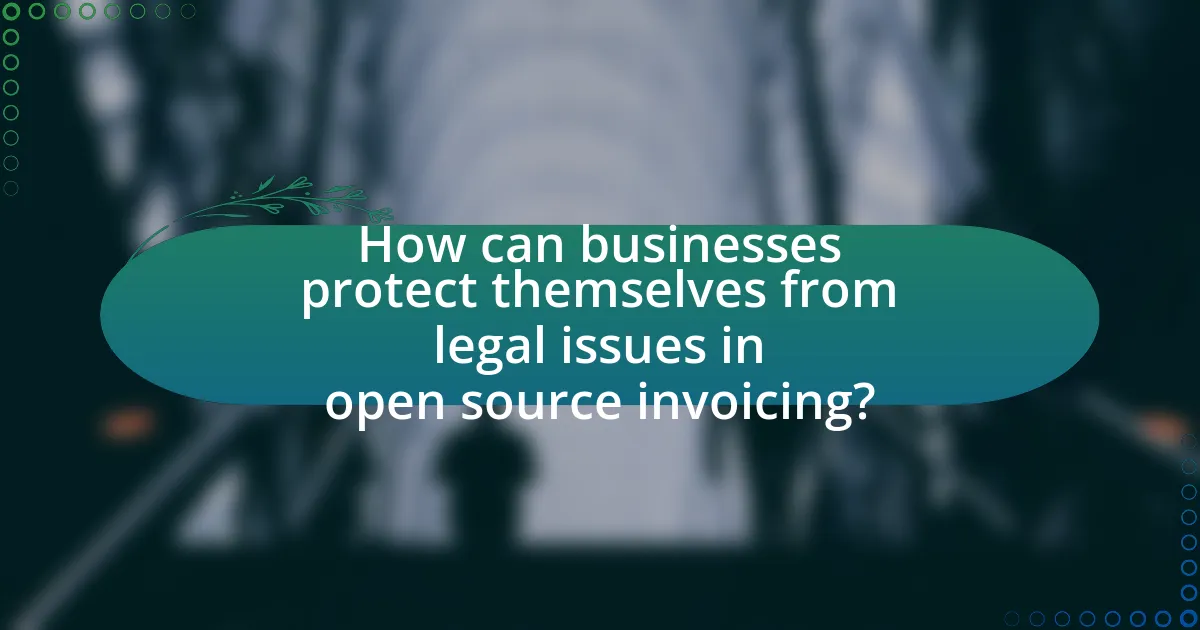
How can businesses protect themselves from legal issues in open source invoicing?
Businesses can protect themselves from legal issues in open source invoicing by implementing a robust compliance strategy that includes thorough due diligence on the licenses of the open source software they use. This involves understanding the specific terms and conditions of each license, ensuring that the software is compatible with their business model, and maintaining proper attribution as required by the licenses. Additionally, businesses should regularly audit their open source usage to identify any potential compliance risks and establish clear policies for the use of open source software within their organization. According to the Open Source Initiative, non-compliance with open source licenses can lead to legal disputes, making it essential for businesses to proactively manage their open source software to mitigate these risks.
What best practices should be implemented for compliance?
To ensure compliance in open source invoicing, businesses should implement best practices such as conducting regular audits, maintaining clear documentation, and providing employee training on licensing requirements. Regular audits help identify any non-compliance issues early, while clear documentation ensures that all software usage aligns with licensing terms. Employee training is crucial, as it equips staff with the knowledge to navigate open source licenses effectively, reducing the risk of legal issues. According to a 2021 study by the Open Source Initiative, organizations that adopt these practices experience a 30% reduction in compliance-related incidents.
How can you ensure proper license management?
To ensure proper license management, implement a comprehensive tracking system for all software licenses used within your organization. This system should include details such as license type, expiration dates, and compliance requirements. Regular audits of software usage against license agreements are essential to identify any discrepancies and ensure adherence to licensing terms. According to a study by the Business Software Alliance, organizations that actively manage their software licenses can reduce the risk of legal issues and save an average of 30% on software costs.
What role does documentation play in safeguarding your business?
Documentation plays a crucial role in safeguarding your business by providing a clear record of processes, agreements, and compliance with legal standards. This clarity helps mitigate risks associated with misunderstandings or disputes, as documented evidence can serve as a reference point in legal situations. For instance, maintaining thorough documentation of software licenses and usage can protect against copyright infringement claims, which are common in open source invoicing. According to a study by the Software Freedom Law Center, proper documentation significantly reduces the likelihood of legal challenges, demonstrating its effectiveness in risk management.
How can legal counsel assist in navigating open source invoicing?
Legal counsel can assist in navigating open source invoicing by providing expertise on compliance with licensing agreements and intellectual property laws. They help businesses understand the implications of using open source software, ensuring that invoicing practices align with the terms of the licenses, which can vary significantly. For instance, legal counsel can clarify obligations under licenses such as GPL or MIT, preventing potential legal disputes that could arise from non-compliance. Furthermore, they can draft or review contracts to include appropriate clauses that protect the business from liability related to open source components, thereby safeguarding the organization against legal issues.
What should you look for in a legal advisor for open source matters?
When selecting a legal advisor for open source matters, prioritize expertise in intellectual property law and familiarity with open source licensing. A qualified legal advisor should have a proven track record of advising businesses on compliance with various open source licenses, such as GPL, MIT, and Apache, which are critical for avoiding legal pitfalls. Additionally, the advisor should demonstrate experience in navigating the complexities of software distribution and contribution agreements, as these are essential for protecting your business’s interests. Their ability to provide clear guidance on risk management related to open source software usage will further validate their suitability for your needs.
How can regular legal audits benefit your invoicing processes?
Regular legal audits can significantly enhance invoicing processes by ensuring compliance with applicable laws and regulations. These audits identify potential legal risks associated with invoicing practices, such as incorrect tax calculations or failure to adhere to contractual obligations. By addressing these issues proactively, businesses can avoid costly penalties and disputes. Furthermore, regular audits promote transparency and accuracy in financial reporting, which can improve trust with clients and stakeholders. According to a study by the Association of Certified Fraud Examiners, organizations that conduct regular audits can reduce the risk of financial misstatements by up to 50%. This demonstrates that implementing regular legal audits not only safeguards against legal issues but also streamlines invoicing efficiency.
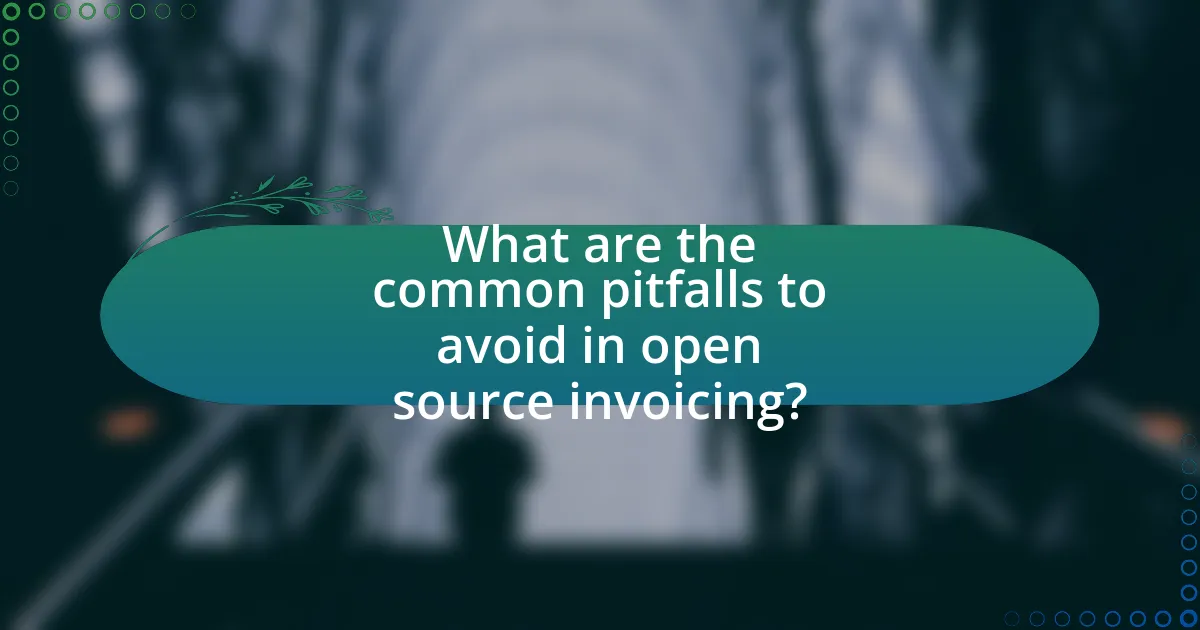
What are the common pitfalls to avoid in open source invoicing?
Common pitfalls to avoid in open source invoicing include failing to comply with licensing requirements, neglecting to track contributions accurately, and overlooking security vulnerabilities. Non-compliance with licensing can lead to legal disputes, as open source software often comes with specific usage terms that must be adhered to. Accurate tracking of contributions is essential to ensure proper attribution and avoid conflicts among contributors. Additionally, security vulnerabilities can expose sensitive financial data, making it crucial to implement robust security measures. These pitfalls can significantly impact the legal standing and operational integrity of a business utilizing open source invoicing solutions.
How can misunderstanding licenses lead to legal trouble?
Misunderstanding licenses can lead to legal trouble by causing individuals or businesses to inadvertently violate copyright laws or terms of use. For example, if a company uses open-source software without fully understanding the specific license requirements, such as attribution or distribution clauses, it may face lawsuits or penalties from the original creators. According to a 2020 study by the Open Source Initiative, 60% of organizations reported legal issues related to license compliance, highlighting the risks associated with misinterpretation. Therefore, clarity in understanding licensing agreements is crucial to avoid potential legal ramifications.
What are the consequences of non-compliance with open source licenses?
Non-compliance with open source licenses can lead to legal action, financial penalties, and damage to reputation. When individuals or organizations fail to adhere to the terms of an open source license, they may face lawsuits from the original authors or copyright holders, which can result in costly legal fees and settlements. For instance, in 2018, a prominent case involved the software company VMware, which faced a lawsuit for allegedly violating the terms of the GNU General Public License (GPL). Additionally, non-compliance can lead to the loss of access to the software, as many licenses include clauses that allow for termination of rights upon violation. Furthermore, companies may suffer reputational harm, which can impact customer trust and business relationships, as seen in various industry reports highlighting the importance of compliance for maintaining credibility in the tech community.
How can you avoid misusing open source components in your invoices?
To avoid misusing open source components in your invoices, ensure compliance with the licensing terms of each component used. This involves thoroughly reviewing the licenses associated with the open source components to understand any restrictions or obligations, such as attribution requirements or limitations on commercial use. For instance, the GNU General Public License (GPL) mandates that any derivative work must also be open source, while the MIT License allows for more flexibility. By adhering to these licensing terms, businesses can mitigate the risk of legal issues related to open source misuse in invoicing.
What strategies can mitigate risks associated with open source invoicing?
Implementing a comprehensive risk management strategy can effectively mitigate risks associated with open source invoicing. This includes conducting thorough due diligence on the open source software being utilized, ensuring compliance with licensing agreements, and maintaining clear documentation of all software components. Regular audits of the software can identify potential vulnerabilities and ensure adherence to licensing terms, which is crucial given that 78% of organizations have faced legal issues related to open source compliance, according to a 2021 report by the Open Source Security Foundation. Additionally, providing training for employees on open source policies and best practices can further reduce the likelihood of unintentional violations.
How can employee training reduce legal risks in open source usage?
Employee training can significantly reduce legal risks in open source usage by ensuring that employees understand licensing requirements and compliance obligations. When employees are educated about the specific terms of open source licenses, such as attribution, modification rights, and distribution rules, they are less likely to inadvertently violate these terms, which can lead to legal disputes. For instance, a study by the Open Source Initiative found that organizations with comprehensive training programs reported a 30% decrease in compliance-related incidents. This highlights the importance of training in fostering a culture of awareness and responsibility regarding open source software, ultimately protecting the organization from potential legal ramifications.
What tools are available to help manage open source compliance?
Tools available to help manage open source compliance include Black Duck, FOSSA, and WhiteSource. Black Duck provides comprehensive open source management by identifying vulnerabilities and license compliance issues in codebases. FOSSA automates the tracking of open source licenses and ensures compliance throughout the software development lifecycle. WhiteSource offers real-time alerts for security vulnerabilities and license compliance, integrating seamlessly with development tools. These tools are widely recognized in the industry for their effectiveness in mitigating legal risks associated with open source software usage.
What practical steps can you take to safeguard your business against legal issues in open source invoicing?
To safeguard your business against legal issues in open source invoicing, implement a comprehensive compliance strategy that includes reviewing licenses, maintaining clear documentation, and conducting regular audits. Reviewing licenses ensures that you understand the terms and conditions associated with the open source software you use, which is crucial for avoiding violations. Maintaining clear documentation of all software components and their licenses helps track compliance and provides a reference in case of disputes. Conducting regular audits of your software usage can identify potential legal risks and ensure adherence to licensing agreements, thereby minimizing the likelihood of legal challenges.
